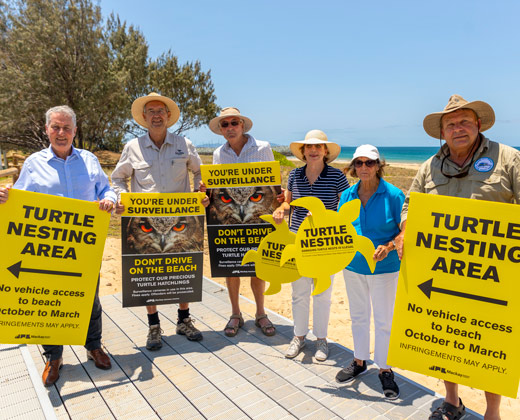Help protect coastal wildlife: Don’t drive on dunes and beaches
Published: 24 Oct 2023
The seaward side of the coastal track along Harbour Beach to East Point is a no-go zone for vehicles and motorbikes in a bid to protect this environmentally sensitive stretch of coastline.
Council has today launched a public education campaign asking users of this area to not drive on the coastal dunes or beach.
The plea is to help protect sea turtles and hatchlings during the nesting season, which began this month and runs through to March, as well as shore birds, which nest along the coastal dunes.
Mayor Greg Williamson was joined by representatives of Mackay and District Turtle Watch Association and Birdlife Mackay for the launch.
The campaign features educational signage onsite, as well as regulatory signage, and offenders will be fined.
Mayor Williamson said public education was the immediate aim of the campaign and stakeholders were hopeful users of the area would co-operate.
“We are not wanting to start fining people from day one, but we will have signage in place and will begin fining offenders if motorists and motorbike riders don’t cooperate,’’ he said.
“That will include surveillance cameras to identify any offenders so Penalty Infringement Notices (PINS) of $774 can be issued by our Local Laws Officers if needed.
“There will also be an increase in patrols in this area, including with the assistance of Queensland Police Service.”
Mackay and District Turtle Watch Association president Steve Fisher said Harbour Beach was a significant site for turtle nesting.
He said that during the 2022-2023 sea turtle nesting season, there were 34 turtle nests along this stretch of beach, with 1610 eggs laid.
“Sea turtle populations require nesting success of more than 80 per cent to be sustainable.
“There was a 96 per cent nesting success on Harbour Beach, with 1560 hatchlings emerging from the nests, although this does not mean that all of those made it to the ocean.”
Mr Fisher said turtles could be disturbed by vehicles, causing them to return to the ocean and not nest.
He said turtle hatchlings on the beach making their way to the ocean could get run over or stuck in wheel ruts.
Mr Fisher said turtles and hatchlings could also become disoriented by lights directly from development and from the glow of the city and lose their way to the ocean.
“Vegetation cover on the dunes is important to screen and protect the nesting habitat and must not be driven over or disturbed.”
Mr Fisher said Harbour Beach was extremely important for turtle nesting.
“The entire East Point ecosystem is important. As adjacent beaches are impacted by development and climate change this area can remain and island ark into the future.”
Mackay Birdlife president John Morris said every year Mackay was the home of 14 species of shorebirds that flew all the way from Siberia and Alaska to spend summer on our beautiful beaches.
“In autumn, they turn around and go all the way back to the top of the world to breed,’’ Mr Morris said.
“They need to feed up after their long journey and fatten up before their return. If they are constantly disturbed, they can’t eat enough and won’t make it back on that long journey.”
Mr Morris said there were also four species of shorebird that lived here all year round and had their nests in the sand dunes.
“Don’t drive on beaches – that’s where they feed,’’ he said.
“Don’t drive on dunes – that’s where they roost, rest and recuperate.
“Don’t drive on dunes – that’s where they nest.
“And keep your dog on a leash and away from the shorebirds.
“Shorebird numbers are declining. Let’s make sure they stay around.”

At the launch of the campaign at Harbour Beach are (from left) Mackay Mayor Greg Williamson, Birdlife Mackay's John Morris (president) and Ian and Mary Cruickshank and Mackay and District Turtle Watch's Fay Griffin and Steve Fisher (president).